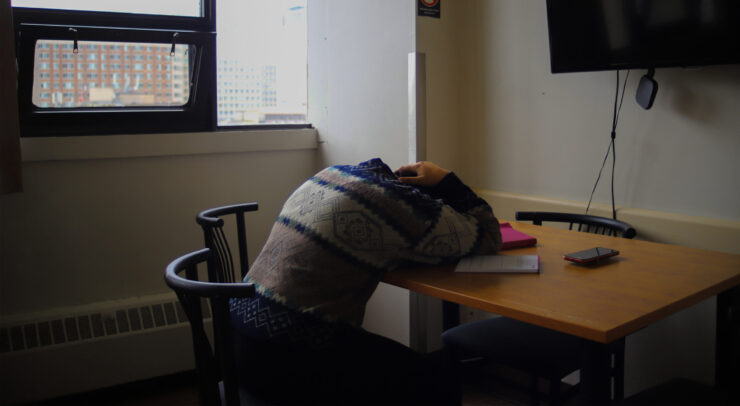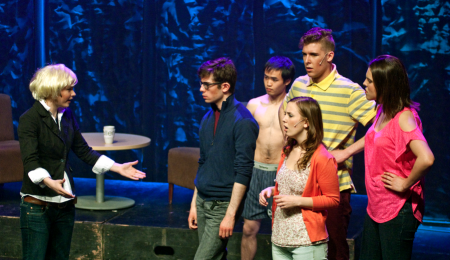In protecting our physical health, our mental health was often compromised.
An often neglected side-effect of COVID-19 is loneliness.
Humans are social creatures. From the moment we’re born — with the exception of COVID-19 babies, perhaps — we are raised to crave social interactions. What was kindergarten through grade 12 if not an excuse to see our friends? Such is why the socially distant university experience was so jarring and isolating for many students on campus last year.
With October being National Mental Health Awareness Month, it is more important than ever that we bring mental health to the forefront of the conversation. A recent study indicated that 71 per cent of university students experienced increased stress and anxiety due to the pandemic. Even so, they are expected to perform as business as usual, despite everything around them being so far from usual.
The experiences of students living through this pandemic are unparalleled. As such, students served as guinea pigs for the U of O as they had their hands full, trying to simultaneously roll out Outlook and create a living environment that didn’t send students into a mental health spiral — both initiatives, it turned out, had their flaws.
Our story begins in the fall of last year. As every school year is, it was marked by feelings of nerves and excitement. As U of O students, as much as we dread essays and exams, we look forward to breakfast specials at Father and Sons, singing our hearts out at karaoke bars on Thursdays (the weekend starts when you want it to), and cringing at the smell of hand sanitizer on the Mondays that follow.
For the University of Ottawa’s incoming class of 2024, the summer of 2020 was riddled with the feeling of butterflies and nervous trepidation. The days leading up to a student’s grand initiation into finally becoming a garnet-blooded Gee-Gee are filled with excitement and littered with “what ifs?”. Honestly, it feels a lot like being a kid the night before a big holiday, like Christmas or Halloween, or the night before the first day of school — unable to sleep from the sheer exhilaration, with a carefully curated outfit laid out in expectation.
This time, instead of backpacks with lunch bags hand-packed by our parents, we embarked with suitcases overflowing with too many sweaters, shoes we never end up actually wearing (my friend brought about five pairs of heels and has, unsurprisingly, yet to wear them all), and an abundance of hopes and expectations.
Since COVID-19 left no part of our lives untouched, the anxiety experienced by soon-to-be first years in the year 2020 was not merely rooted in questions of how to have the best decorated room, whether or not we’d like our roommates, or if the caf food would be worth the fat cheque we were dropping on it.
Students hoping to live in residence last year were left with a new variety of questions: would they actually be allowed to live in residence? Would they even have a roommate? Would they make friends in the socially-distant dining hall? How would they walk the fine line of “smizing” (squinting your eyes just enough to be deemed friendly and not totally creepy) when trying to make friends in the hallway?
It is true that the measures put in place by the University of Ottawa were necessary for the health and safety of everyone living in residence. However, in protecting our physical health, our mental health was often compromised.
“I find the rooms are so compressive that it’s really easy to get anxious and, like, feel like you’re trapped in this room. Like, yeah, I have friends, but it’s not the same as being home and your parents are right there,” shared Kiara Leahy, a first-year living in Marchand residence, in an interview.
Students entering the campus for the first time were unprepared for a number of things.
Students living in Henderson were unprepared for the hike they’d have to embark on every day in order to make the most of their meal plan — which, by the way, was not the 24-hour dining hall, equipped with a salad bar and midnight snacks, that they were paying for.
The coronavirus was thorough in disrupting our routine in every manner. Every other week, the U of O would toss a new mandate at us regarding our cafeteria experience: indoor seating, only outdoor seating, no take-out, only take-out, but make sure to make friends (while you sit six feet apart and fruitlessly try to make conversation and inadvertently play the world’s most inefficient game of telephone). This unpredictability, paired with the awkward social climate of the cafeteria, was another wrench in our best-laid plans and took a toll on students’ mental health.
“People are wanting to get into their rooms and away from people. With COVID-19, people’s social skills, I guess you could say, have kind of dwindled,” Serena Missons, a first-year living in 90U Residence, stated in an interview.
We share that sentiment. There are so many people on campus that we’ve seen too many times that it feels just plain awkward to say “hi” now. Despite knowing what the other person had for breakfast via their Instagram story that day, we tend to walk right past one another.
Though the dining hall heightened our sense of loneliness, those without it are even more isolated.
“I do notice that it can be lonely, especially with virtual classes. I could be in my room all day, like there’s no reason for me to leave the house, so that can be difficult on your mental health,” stated Jayden Hall, a first-year residing in Friel Residence, in an interview.
Thus, we spent our time in residence patiently waiting to organically meet other students and have sparks fly instantly. We would romanticize bumping into someone in a common room or elevator and sparking up a conversation and an immediate, life-altering connection.
Instead, the common rooms were closed and the floor meetings were virtual — with nearly no one in attendance, and those who were barely spoke.
Of course, we did make friends here and there. However, more often than not, they moved out a week later and we’d be left wondering — why are we still here? Should we be going home too? The worst was noticing fewer and fewer windows lit up by colourful LED lights in 90U as the weeks dragged on.

Confronted with more school work than before, teaching ourselves asynchronous courses while paying the same tuition, trying to adjust to a new city while struggling to make friends that don’t disappear faster than nail polish chips (which is very fast) — it is fair to say we were overwhelmed. It’s okay though — some residents received a couple of flyers, pipe cleaners, and a pack of Orbeez during mental health week. So, obviously, it was all made better instantly.
Some people questioned why we even bothered heading to campus during this obviously unsocial time. Sometimes we questioned it, too.
We were steadfast in our goals of having the first year we wanted — with some compromises. We looked forward to being able to live independently without parental supervision for the majority of their teenage years. With our last year of high school taken away from us, we were determined to make the most of the year ahead.
Part of it was sheer stubbornness. We didn’t want the people who continuously told us not to bother trying out residence, criticizing it to be a waste of time and money, to have that ‘I told you so’ moment. This private battle at the back of my head made the idea of moving back home reek of failure. It felt like giving up, throwing in the towel — they would be right and we’d admit we couldn’t handle living on our own and being an adult.
We’re grateful for the memories we did make in our pseudo-residence experience. However, as we finally embark on that first-year friend-making frenzy in our second year as pandemic restrictions decrease, we realize what we missed out on. We also realized that the tough year we had was a shared experience. By way of meeting people who lived in residence, too, it became apparent that we all experienced the same hardships. Though we didn’t know it at the time, we were not alone.
Only now that we are having these conversations with our newfound friends do we have that insight regarding our collective first year of COVID-university. Such is the taboo surrounding mental health.
The increase of stress and anxiety felt by university students due to the COVID-19 pandemic can be crippling and going through it alone only makes matters worse. That’s why it is so important to reduce mental health stigma — stress balls and links to mental health hotlines can only do so much. Having real conversations, creating that support group so many of us lacked, and putting an end to suffering in silence is what makes the real difference.





